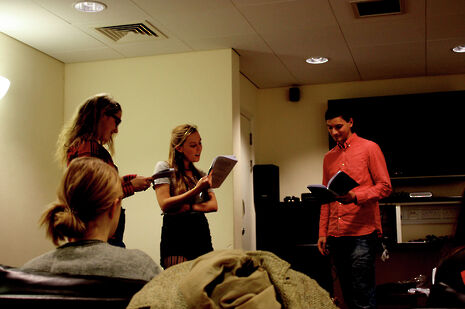Preview: Love in a Maze
If you want bawdy innuendos, saucy nuns and a fun night at the theatre, look no further than Ella Godfrey and Simon West’s Love in a Maze

When Eliza Haywood’s novella Fantomina: Or, Love in a Maze was first unleashed upon the readership of the 18th century, there was a moderate chance that English society would never quite recover. After all, presenting women as active sexual beings was – and still often is – a very confounding matter to the poor European psyche. Risky business, that one. In subverting the conventional ‘damsel in distress’, Haywood establishes her protagonist in terms of sexual desire rather than modesty; agency instead of objecthood.
These matters are secondary, however, in this comedic adaptation of Love in a Maze. “I just thought the book would make a funny play”, explains director Ella Godfrey. The other half of the writer-director duo, Simon West, expands on the subject: “Men get to do crude sexual humour all the time and no one gives a monkeys. Is it a political statement when it’s the other way around? Maybe. I don’t know. We just wanted to be funny”.
Hammering the emphasis on the word funny, Love in a Maze strives above all to be lighthearted and silly. As I lurk on the couch, the rehearsal room has the energy of a bottle of soda that’s been shaken one too many times in the depths of the shopping bag on the way home from Sainsbury’s. After some general enthusiastic banter, fitting on a veil, and a warming-up game which involves Simon commanding the cast to recite their favourite line “like you are a sexy nun”, the team finally settles to rehearse a scene.
Centering around the character of Fantomina (Kathryn Cussons), the play opens with the nuns of a convent receiving an eager novice. Inquiries are made. “And was he taking you from the front or behind?” investigates Gertrude (Jasmin Rees) when hearing the confession of the newcomer. Proceeding to tell the autobiography of Fantomina, the nuns recreate everything in front of their newest member – well, almost everything.
Ella sheds light on the process behind the show: “this is a comedy about sex, and balancing those two things can be a bit tricky. We didn’t want to shy away from the subject matter, and the comic potential therein, but we also didn’t want the show to become graphic or creepy. Our compromise has been gratuitous euphemisms and sensual violin music”.
It is evidently a fine line. The solution is an abundance of bawdy talk, while all the actual action is only flirted with and ultimately taken off stage – a choice made to preserve the fragile Cambridge audience, I think.
Between collaborative throwing around ideas and debating the application of a certain Bristolian accent, the cast briefly discusses the importance of gender. Jasmin questions whether comedic characters even need a clearly defined gender, a point specifically interesting as there is some appropriate ambiguity hanging around the narrative. “Now that Donald Trump is President-elect, there seems to be little future for women. There is now just one gender: man. And man lives for one thing: sex”, Ella quips. A touch of reality.
However, the title of the play suggests that love plays a role, too. “In the play a dreamy young lady ‘falls in love’ with a chauvinist idiot; it’s up to our audience to decide just how cynical we are being, because we have no idea”, says Simon. Replacing the importance of fidelity with constancy, the take the play has on love defies definition. “Our ending, bizarre as it is, is designed to avoid reaching any conclusion whatsoever”.
Bringing the Enlightenment-era novella on stage, Love in a Maze takes a text which once shocked its readers and provoked literary controversy and transforms it into a comedy of pronounced sexuality. Featuring saucy nuns and multiple not-so-subtle innuendos, its characters have one definite driving force: sex. Or, as voices Jasmin: “a biting satire on the low-cost intercontinental travel business”.
Love in a Maze is on from Wednesday 30th November to Friday 2nd December at the ADC
 Comment / Plastic pubs: the problem with Cambridge alehouses 5 January 2026
Comment / Plastic pubs: the problem with Cambridge alehouses 5 January 2026 News / Cambridge businesses concerned infrastructure delays will hurt growth5 January 2026
News / Cambridge businesses concerned infrastructure delays will hurt growth5 January 2026 News / New movement ‘Cambridge is Chopped’ launched to fight against hate crime7 January 2026
News / New movement ‘Cambridge is Chopped’ launched to fight against hate crime7 January 2026 News / AstraZeneca sues for £32 million over faulty construction at Cambridge Campus31 December 2025
News / AstraZeneca sues for £32 million over faulty construction at Cambridge Campus31 December 2025 News / Uni-linked firms rank among Cambridgeshire’s largest7 January 2026
News / Uni-linked firms rank among Cambridgeshire’s largest7 January 2026








